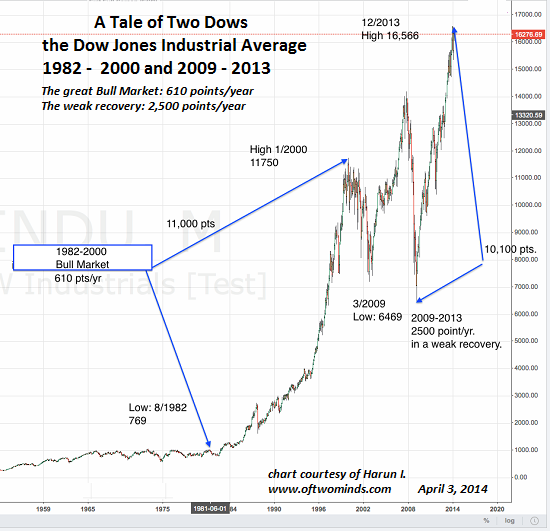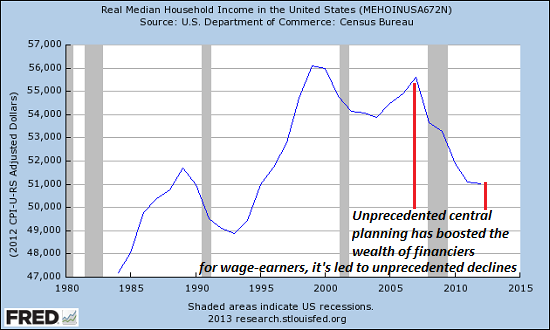Here’s What I Recommend in the Stock Market: Zip, Zero, Nada - Washington's Blog - - June 20, 2014 - I recently received an email from a reader suggesting I back up my opinions by publishing my own trading positions. The reader suggested that failure to put my money where my mouth is diminished the gravitas of the opinions published here. He suggested that if I really believed in The Generational Short: Banks, Wall Street, Housing and Luxury Retail Are Doomed, I should bet against these for however long it took the trend to manifest–decades if necessary. I understand the credibility value of putting my money where my mouth is: without some evidence that the writer is walking the walk, then we assume he/she is merely talking the talk or talking his book, i.e. supporting his positions publicly while he unloads the position in private. There are fundamental problems with publishing one’s trading positions as a gambit for credibility, and it’s worth delineating them because they reflect the inherent uncertainties of trading and prognostication. 1. Markets do not trade on fundamentals. Though pundits and punters may refer to various fundamentals (price-earnings ratios, etc.) to justify their expectations of future stock prices, markets trade on emotions and the zeitgeist generated by Central Planning intervention, both publicly announced and secretly executed.
As a result, any analysis of fundamentals is for historical context only. Misguided attempts to predict what the market should do if fundamentals mattered rarely succeed, for the simple reason that fundamentals don’t matter. They are invoked after the fact to justify one trend or another. Here is a chart of the Dow Jones Industrial Average (DJIA). Did the fundamentals of the corporations that make up the DJIA fluctuate as wildly between 2000 and 2014 as the DJIA itself? The answer is no: what fluctuated wildly was the emotions of punters and the risk appetite set by Central Planning interventions.
After 6 Years of Unprecedented Central Planning, the Economy Is More Fragile Than Ever - Washington's Blog - June 19, 2014 - We will all discover that the economy is much more fragile than advertised by the Central Planners and their media toadies. This week I have made the case that the past 13.5 years have been the most destructive to the core values of the nation in U.S. history. The same holds true for the economy, which has been critically weakened by 6 years of unprecedented Central Planning. What do I mean by Central Planning? Here are the key characteristics of Central Planning:
1. The central bank/state intervene in the economy in a dominant fashion, controlling functions such as interest rates by order of central authorities that were once set by decentralized, self-organizing markets.
2. The central bank/state pick winners and losers: for example, the Too Big To Fail Banks (TBTF) were selected to win, as the central bank/state bailed out their private losseswith public-taxpayer money. In effect, the central state/bank enrich cronies at the expense of everyone else.
3. The central bank/state manipulate the nominally “free” market to boost asset valuations as a way of enriching cronies who own most of the financial assets and as a public-relations charade to mask the failure of their picking winners and losers.
In other words, in centrally planned economies, markets are not allowed to discover price–they exist only to reflect positively on Central Planners.
4. The central bank/state use the power of the printing press to create as much money as they need to reward cronies and cram their decisions down the throat of the economy.
5. The central bank/state use the power of their public policy announcements to manipulate behavior and the financial markets while keeping programs that might attract scrutiny secret.
Inflation? Only If You Look At Food, Water, Gas, Electricity And Everything Else - The Economnic Collapse Blog - Michael Snyder - June 19th, 2014 - Have you noticed that prices are going up rapidly? If so, you are certainly not alone. But Federal Reserve chair Janet Yellen, the Obama administration and the mainstream media would have us believe that inflation is completely under control and exactly where it should be. Perhaps if the highly manipulated numbers that they quote us were real, everything would be fine. But of course the way that the inflation rate is calculated has been changed more than 20 times since the 1970s, and at this point it bears so little relation to reality that it is essentially meaningless. Anyone that has to regularly pay for food, water, gas, electricity or anything else knows that inflation is too high. In fact, if inflation was calculated the same way that it was back in 1980, the inflation rate would be close to 10 percent right now. But you would never know that listening to Federal Reserve chair Janet Yellen. In the video posted, you can listen to her telling the media that there is absolutely nothing to be concerned about... Just the other day, the Bureau of Labor Statistics announced that the price index for meat, poultry, fish, and eggs has just soared to a new all-time high. This is something that I have repeatedly warned would happen. Just check out this article and this article. And it isn't just meat prices that are going up. One of the largest coffee producers in the entire world just announced that it is going to be raising coffee prices by 9 percent...
Yellen forecasts a slow rise in interest rates - Bank votes to reduce economic stimulus again by cutting bond purchases - Marketwatch Wall Street Journal - Greg Robb - June 18, 2014 - Federal Reserve Chairwoman Janet Yellen was more kitten than lion on Wednesday, sticking to her guns that the central bank can hold short-term interest rates steady until the middle of next year and then raise them gradually, and downplaying recent strong inflation readings. In its latest dot-plot forecast, the Fed did see a slightly faster pace of tightening in the cards. But the slight increase was overlooked by the market that focused more on Yellen’s remark that the recent inflation data was “noisy.” The S&P 500 index SPX +0.17% jumped to a record close following Yellen’s remarks. In contrast to Bank of England Governor Mark Carney, Yellen suggested the Fed is comfortable that it can hold rates steady for a considerable time after it ends its asset purchase program. Last week, Carney warned that the first interest-rate hike could come sooner than the market expected. Economists said the latest Fed projections point to a first rate hike in June 2015. Short-term interest rates have been steady near zero since December 2008.
Price Index for Meats, Poultry, Fish & Eggs Rockets to All-Time High - CNSNews - Ali Meyer - June 17, 2014 - The seasonally-adjusted price index for meats, poultry, fish, and eggs hit an all-time high in May, according to data from the Bureau of Labor Statistics (BLS). In January 1967, when the BLS started tracking this measure, the index for meats, poultry, fish, and eggs was 38.1. As of last May, it was 234.572. By this January, it hit 240.006. By April, it hit 249.362. And, in May, it climbed to a record 252.832.
The Idea That Won’t Die: How Taxing Cars by the Mile is Back on the Agenda Again - The Blaze - Jun. 13, 2014 - The Congressional Budget Office released a report this week that once again raises the idea of taxing drivers based on how far they drive, in order to generate more revenue for federal highway programs. CBO’s report said the spending obligations of the federal highway trust fund will be higher than available revenues starting in 2015. It said that reality will force Congress to choose whether to reduce highway spending, find new sources of money, or some combination of both. One option for raising money, the report said, its to create a “mileage-based user fee to raise revenues.” The report seemed to defend this option, by saying it “could lead to more efficient use of the transportation system.” CBO has raised the issue a few times before as an option Congress should consider. Back in 2011, it released a report that used several pages to analyze how a “vehicle miles traveled,” or VMT system, might operate. According to that report, it’s a “consensus” view of transportation experts that a VMT system should be seen as a “leading alternative to fuel taxes as a source of funding for highways.” It said VMT taxes in other countries have been shown to reduce road traffic, since people choose to drive less in order to avoid higher taxes. CBO imagines collecting the tax by fitting each car with a device that tracks how far the car has gone. That data could be read electronically whenever someone uses a toll or stops at a service station for gas. While CBO admits there are some privacy issues involved, it suggested that the electronic devices would be used to generate information that is only collected by a private entity, not the government, for the purpose of calculating mileage taxes.
2 senators want to hike US gas tax for first time since 1993 - Reuters - June 18, 2014 - Two U.S. senators on Wednesday said they want to raise the federal gasoline and diesel tax by 12 cents a gallon to prevent a fund that pays for about half of the country's transportation projects from running out of money in August. Republican Sen. Bob Corker and Democrat Sen. Chris Murphy called for raising the tax 6 cents a year for two years and linking future fuel tax increases to inflation. The gasoline tax is now 18.4 cents a gallon, and the diesel tax is 24.4 cents a gallon. The tax has not been increased since 1993, and hiking taxes is politically unpopular ahead of midterm elections in November. "I know raising the gas tax isn't an easy choice, but we're not elected to make easy decisions. We're elected to make the hard ones," said Connecticut's Murphy, in a statement.
The US Healthcare System: Most Expensive Yet Worst In The Developed World - Zero Hedge - Tyler Durden June 22, 2014 - One month ago we showed that when it comes to the cost of basic (and not so basic) health insurance, the US is by far the most expensive country in the world and certainly among its "wealthy-nation"peers (in a world in which indebtedness is somehow equivalent to wealth), which in the context of the irreversible socialization of American healthcare, was in line with expectations.
Cronyism In The 21st Century - Zero Hedge - Tyler Durden - June 21, 2014 - Authored by Mark E. Jeftovic, CEO easyDNS Technologies; originally posted at DollarVigilante.com, - ...So let's do something different here and accept a core premise of Capital, and say that wealth inequality is increasing, and that it's a bad thing. Where the point is completely missed is in what causes it (ostensibly "free market capitalism") and what to do about it (increase government control, induce more inflation and raise taxes). The point of this essay is to assert that it is not unchecked capital or runaway free markets that cause increasing wealth inequality, but rather that the underlying monetary system itself is hard-coded by an inner temple of ruling elites in a way which creates that inequality.
To
paraphrase; "The American Standard of Living Will Decline" was stated
by Obama in speeches, if you care to decipher, them on several
occasions. The American people were not listening at the time, or they
were not capable or realizing what he said since he did not spell it out
for them directly. I heard what he said loud and clear.







No comments:
Post a Comment